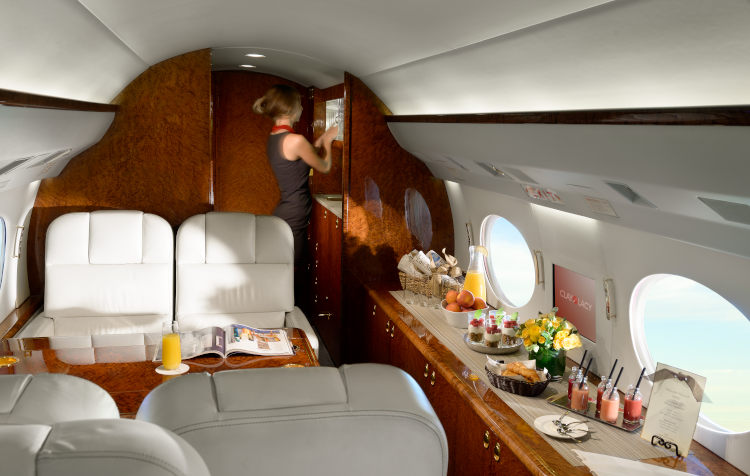In the world of private aviation management, charters, maintenance, and FBO services, Clay Lacy Aviation is one of the longest-running and most experienced companies you will find. Founded in 1968, the company began by offering charter services from Van Nuys Airport in Los Angeles. At the time, it was the only such company west of the Mississippi. Clay Lacy then added additional services: aircraft management, maintenance, and in 1981 the world’s first all-jet FBO. To learn more about recent developments at the company, including the pandemic effects, SherpaReport spoke with Scott Cutshall, SVP Development and Sustainability at Clay Lacy’s FBO in Orange County.

Background
The company offers four primary services:
- Aircraft management. Clients who use Clay Lacy’s aircraft management services benefit from the company’s decades of experience and purchasing power. Every aspect of aircraft care, from hangaring to crew, is coordinated by Clay Lacy on behalf of the owner. For owners who want to earn offsetting income from their aircraft by making them available for private charter, Clay Lacy offers complete sales and marketing services. (see below).
- Aircraft charters. Clay Lacy Aviation boasts “one of America’s largest, most diverse private jet charter fleets: with craft ranging from light (Pilatus PC-24, Cessna Citation Ultra, etc.) to large jets (Bombardier Global 6000, Gulfstream G550, etc.). Cutshall says that of the 150 or so aircraft that they manage for clients, approximately 70% are available for charter. This allows them to offer the charter customer a broad range of options (an estimated 43 models currently). Regular charter customers can join Clay Lacy Preferred. With a minimum deposit of $100,000, they received preferred rates and guaranteed availability, and no blackout dates.
- Maintenance. A complete array of maintenance services are available at facilities in San Diego, Los Angeles, and Oxford, CT, with an additional mobile maintenance unit in Seattle and Orange County. Cutshall says that their teams can oversee any and all aspects of maintenance from minor cleanings to full aircraft interior refurbishments, avionics upgrades, WiFi installations, and heavy inspection services.
- FBOs. Clay Lacy opened the world’s first all-jet FBO at Van Nuys, California in 1981. A second FBO recently opened in Orange County, and a third is due to open in 2022, in Oxford, CT.
Business During the Pandemic
The COVID pandemic affected all areas of the aviation industry, and Clay Lacy was no different. Cutshall says that they saw “a dramatic decrease – about 94% - in flight activity in March 2020.” Numbers started to pick up again in June 2020, but demand really took off at the start of 2021. That demand continues to be strong, and by May, flight activity was not just reaching but exceeding 2019 levels, a trend that Cutshall expects to continue throughout the year. A significant portion of business is from new customers. In 2020, 35% of all charter flights were for new clients.
This period has also seen record growth in demand for aircraft management services, especially in two specific groups: new aircraft owners and corporations who are switching from an in-house flight division to an external management solution. (Note demand is at record levels across the private aviation industry)
When the pandemic began, Clay Lacy assembled a team from all divisions of the company to formulate a safety response. They established the CleanCheck Standard initiative, combining advice from the CDC, DOT, and FAA with top-of-the-range sanitization methods to protect customers and staff both on ground and in the air. Every aircraft has a custom cleaning and sanitization kit on board, with crew having been trained in how to use it. This provides extra security to the regular pre- and post-flight cleanings, and ensures that there are always the necessary supplies available. Special ionization and anti-microbial treatments are also applied at the aircraft home bases.

Sustainability Initiatives
The team at Clay Lacy Aviation also recognize the importance of adding environmental and sustainability initiatives, and for this they turned to the experts. Cutshall says, “We are experts in aviation, so it made sense to consult experts in sustainability for this.” In 2019, they engaged World Kinect Energy Services to help develop a sustainability program. As a result of that collaboration, Clay Lacy has come up with a 9-point sustainability strategy, which includes:
- Transitioning to carbon-neutral operations
- Sourcing 1/3 of onsite electricity from renewable sources
- Qualifying for membership in the EPA’s Green Power Partnership
- Launching solutions to help customers operate more sustainably
- Meeting or exceeding all hazardous materials use and disposal regulations
- Fostering a company-wide culture of sustainability
- Reducing fossil fuel reliance
- Continually improving operational sustainability
- Supporting local communities
A carbon offset option was introduced to aircraft owners last fall. Those who volunteer to enroll will have their fuel usage tracked over the year. That usage is then reported to World Kinect, who purchase the offsets and retire the credits in the name of the owner. Each owner who participates then receives a certificate showing which projects they helped to fund. All projects are certified through Goldstandard.org or Verra.org. The FBOs also offer onsite offset options to those buying fuel as well as availability of Sustainable Aviation Fuel (SAF). Carbon offsets will be introduced to charter customers as an optional line item later this year. In addition, the Van Nuys FBO now has a 500kw solar array and 40 new EV chargers.
Cutshall reiterates that the key with their sustainability initiatives, as with all aspects of their business, is transparency. He notes the challenging learning curve: “There are more questions about sustainability initiatives than there are answers, so we are taking care to share the information and facts that are endorsed and verified by World Kinect and the EPA.”
At the time of writing, Clay Lacy is undergoing an independent sustainability audit, carried out by 4Air. They are the first company to undergo such an audit and results are expected within two to three months. Cutshall says that the audit is useful because it means they have to track and measure the outcomes of their actions. For example, they have switched from offering bottled water on flights and at their ground facilities, and are now offering boxed water instead. But to measure the concrete impact of that requires calculating how many plastic bottles were being used, how many boxes are being used now, and what the overall reduction in plastic use has been.
Whether talking about sustainability, charter customer service, or aircraft management options, Cutshall notes that Clay Lacy Aviation is committed to “simplifying complexity.” He says, “This is an industry that is highly regulated and ever-changing. We want to simplify things for the client so that flying and owning an aircraft is an enjoyable experience.”

